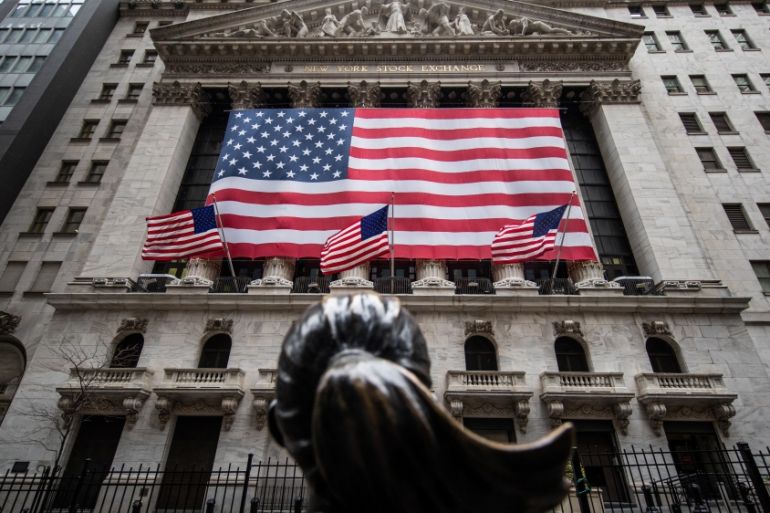US stocks soar as states ease coronavirus restrictions
All three major US stock averages are now within 20 percent of their record closing highs reached in February.

Investors are betting the United States economy may soon reopen and are hoping companies stung by stay-at-home orders will see a surge in business.
The Dow Jones Industrial Average rose 358.51 points higher or 1.51 percent, to end at 24,133.78. The S&P 500 – a proxy for the health of US retirement and college savings accounts – ended the day 1.47 percent higher, while the Nasdaq Composite Index added 1.11 percent.
Keep reading
list of 3 itemsCoronavirus infects thousands of US meat, food-processing workers
US stocks rise, driven by tech sector and easing of lockdowns
All three major US stock averages advanced, and are all now within 20 percent of their record closing highs reached in February. The S&P 500 is on track for its best month since 1987, after trillions of stimulus dollars helped US markets claw back much of the ground lost since the coronavirus crisis brought the economy to a grinding halt.
“Normalisation … we will never really recover and go back to the way we were. It goes to the point of a new normal [of] what life will be like,” said Kramer Capital Research Chief Investment Officer, Hilary Kramer. “I am always an optimist on the market, we have all sorts of new categories that are starting to really catch a bid, whether it be telemedicine, documentation, e-sign, [or] distance learning, but we aren’t going back to where we were.”
Several states have begun easing stay-at-home restrictions, in efforts to revive economies and get Americans back to work following crushing job losses.
Last week, Congress approved another stimulus bill of $484bn to help offset the economic consequences of coronavirus measures. So far, the US has approved $2.5 trillion or 12.1 percent of its gross domestic product in direct fiscal support through benefit programmes, tax relief and federal spending.
But analysts at Goldman Sachs think more will be needed as lockdown measures remain in place in most of the US.
“Despite the substantial support that federal fiscal policy has already provided, we think more is likely to be necessary,” Goldman wrote in a note to clients on Sunday. “We now expect Congress to approve another $550bn in calendar year 2020, roughly $400bn of which would come during the 2020 fiscal year that ends in September.”
Some 173 companies in the S&P 500 are scheduled to report quarterly earnings this week, including Apple, Amazon.com, Microsoft, Boeing, Ford, General Electric, ExxonMobil and Chevron.
Analysts expect a drop of nearly 15 percent in first-quarter earnings of S&P 500 companies, with profits for the energy sector estimated to have crashed 68 percent.
Neil Shearing, Group Chief Economist at Capital Economics, predicts that the fallout from the virus may result in governments expanding their range of powers.
“In 2008, governments backstopped banks. In this crisis, they have backstopped large tracts of the non-financial corporate sector too,” Shearing wrote in a note to clients on Monday. “New powers are often easy to acquire but difficult to give back.”